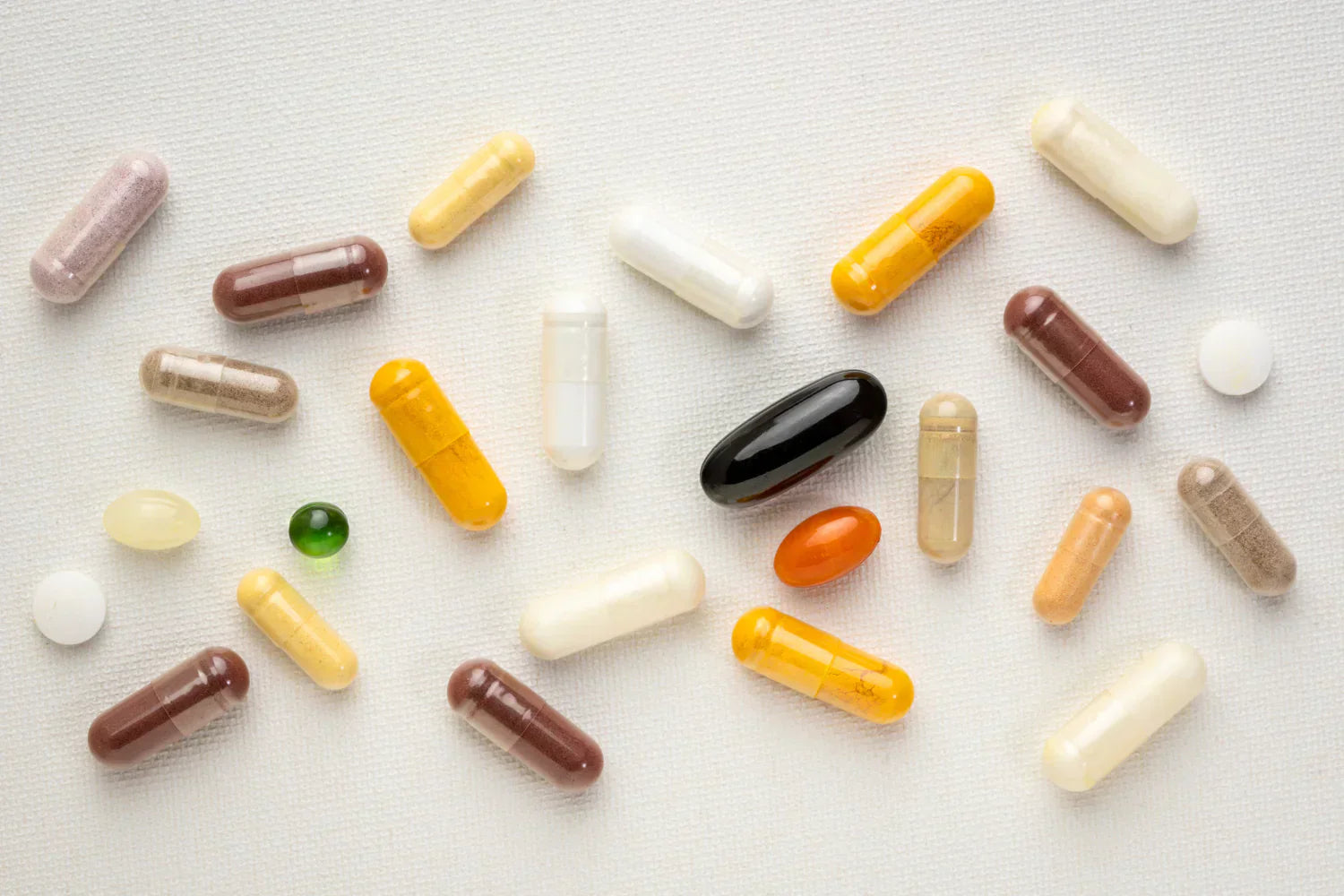These days, capsules don’t have to be made from gelatin. In fact, capsules made with animal ingredients are now considered passé, and a new kind of capsule has taken center stage. Vegetable capsules, also known as vegetable cellulose capsules, are even more beneficial than gelatin capsules in many ways while being vegan friendly and not posing any ethical concerns.
What are vegetable capsules, what kinds are there, and why should you choose vegetable capsules for your supplements? Discover all the answers to these questions and more over the course of this complete vegetable capsule guide.
What Are Vegetable Capsules?
The term “vegetable capsules” widely refers to any supplement capsules that are not made with gelatin. While wood or cotton cellulose is the substance most commonly used to make vegetable capsules, they can also be made with seaweed or even fungus.
One alternative that has come to the fore recently is tapioca capsules. They offer many of the same benefits as vegetable cellulose capsules while being even easier to digest and more nutritionally advantageous.
Vegetable capsules were mainly developed to serve as an alternative for vegetarian and vegan customers. Over time, though, they’ve become the norm as the average consumer has moved away from animal products and has begun valuing the ethics and sourcing of their products more highly.
- Vegetable capsules are supplement capsules that don’t contain any animal ingredients
- Wood cellulose is the most common substance used
- Vegetable capsules offer many advantages over the animal alternative aside from being vegan
What Are Vegetable Capsules Made Of?
The first vegetable capsules to reach the market were made with vegetable cellulose derived from trees or plants. This material isn’t the best for the human digestive system, however, spurring efforts to develop alternative vegan capsule formulations.
Along the way, manufacturers have experimented with modifying plant cellulose, making a cellulose-like substance with fungus, and extracting a special kind of cellulose from seaweed. The vegetable capsule material the industry has refocused on in recent years, however, is tapioca starch — an entirely natural and benign food product derived from the cassava root, which is also used to make alternative flour products.
Types of Vegetable Capsules
It’s possible to make vegetable capsules using a variety of different ingredients. Cellulose capsules were the norm for decades, but both consumers and manufacturers are rapidly coming to prefer simple, organic softgels made with versatile tapioca starch. Let’s examine all the available options:
Tapioca Starch Capsules
Tapioca starch is a natural derivative of the cassava root requiring very little refining or processing to be used as a softgel capsule base. It can be produced entirely organically, and the human body digests it easily. Tapioca starch even has nutritional benefits that add to the benefits of the supplements it encapsulates.
Vegetable Cellulose Capsules
The industry standby, vegetable cellulose capsules have hard shells and are tougher to swallow. Processed and hardened vegetable cellulose is also a substance the human body isn’t designed to digest, leading to a growing perception that it’s an inferior option when compared to new forms of capsules and softgels.
HPMC (Hydroxypropyl Methylcellulose) Capsules
HPMC capsules consist of a modified form of vegetable cellulose that is believed to offer certain benefits above and beyond normal vegetable cellulose in capsules. It is expensive to make, however, and modified substances should always be studied carefully before being introduced to the public.
Pullulan Capsules
Pullulan is made by feeding fungus on a base of corn or tapioca starch. To make it stable, though, carrageenan is usually added, a lamentaby common but fully toxic substance used widely in the supplement industry. Capsules made just with tapioca starch offer the same advantages of pullulan but with no need for additives or advanced processing techniques.
Alginate Capsules
Alginate capsules consist of an extract of seaweed that’s quite expensive and wasteful to make. These capsules don’t offer any more advantages than tapioca starch capsules, and they’re remarkably environmentally unfriendly. First, the seaweed must be harvested, then almost the entirety of the plant is discarded post-extraction.
Why Choose Vegetable Capsules?
Gelatin and vegetable capsules might seem similar at first, but that’s before you scratch the surface. Underneath, gelatin capsules enable cruelty to animals, they pose concerns to your health, and they’re even usually more expensive these days. Let’s take a look at the reasons you should choose vegetable capsules for your supplements in a bit more detail:
- Ethical concerns: The main reason consumers shy away from gelatin capsules is over ethical concerns. Even among animal industries, gelatin harvesting is particularly brutal, necessitating an alternative.
- Customer health: Gelatin can be healthy if produced properly. Gelatin used in supplements, however, is a byproduct and often contains various animal and agricultural toxins.
- Pricing: Gelatin capsules can be pricey now that they’re out of style. Tapioca starch softgels are now less expensive than gelatin capsules ever were while offering many impressive advantages.
- Product variety: While we think tapioca softgels are the best, you have quite a few options to choose from in the vegetable capsule market. Gelatin is just gelatin.
- Versatility: Vegetable capsules can contain anything that gelatin capsules can. On the whole, they’re actually more versatile than gelatin.
Benefits of Vegetable Capsules
The primary benefit of vegetable capsules is, of course, their lack of animal products. The right kind of vegetable capsule, however, can offer profound benefits that make alternatives pale in comparison. Tapioca starch, for instance, is quite nutritious, and the body digests it easily.
For manufacturers, vegetable capsules can be very advantageous due to their relatively low price point. While boutique vegetable caps like HPMC and pullulan can be quite spendy, tapioca starch capsule prices generally track with the gelatin equivalent.
- Analysis: Offering the ethical benefits of vegetable cellulose but with the swallowability and price of gelatin, tapioca vegetable capsules provide truly impressive benefits.
Downsides of Vegetable Capsules
Previously, one of the main downsides of using vegetable instead of gelatin capsules was their rigidity and the overall unsuitability of wood cellulose as a substance for human consumption. With no clear alternative available, however, it would be some time until this detractor was solved with tapioca starch capsules, which offer the same softness and flexibility of gelatin but with none of the ethical concerns.
As such, the last remaining disadvantage of vegetable capsules versus gelatin softgels has been eliminated, and without having to resort to potentially even less-suitable alternatives like capsules made from fungus or seaweed.
-
Analysis: If you choose tapioca starch capsules, vegetable capsules have no disadvantages when compared to soft gelatin capsules.
Vegetable vs. Gelatin Capsules
Non-gelatin capsules have indisputably become the norm. Why have both manufacturers and customers shifted toward preferring vegetable capsules, though? Let’s zoom in on some of the most compelling differences between these two capsule types to better understand the reasons:
- Digestibility: Some types of vegetable capsules offer worse digestibility than gelatin. With the advent of tapioca starch softgels, however, vegetable capsules can now be just as digestible as the animal-product equivalent.
- Nutritional benefits: Digestive gelatin has some impressive nutritional properties, making it popular as a supplement. That’s different from the kind of gelatin used to make softgels, however. Even without the ethical concerns, tapioca is still better for you than bovine or equine gelatin.
- Manufacturing ease: Animal gelatin is a messy business. Some forms of vegetable capsules are just as difficult to make even if they aren’t as unethical. Tapioca starch capsules, however, are just as simple to manufacture as gelatin softgels — and no animals are harmed in the process.
- Shelf life: On average, tapioca capsules last longer than gelatin capsules on the shelf, meaning they’ll stay good for a greater duration after their MFG dates. Animal products like gelatin degrade relatively quickly while plant extracts like tapioca tend to survive the test of time slightly better.
- Ethical concerns: The cassava from which tapioca starch originates can be grown entirely sustainably and ethically. Gelatin capsules can only exist with the death of an animal, however, raising concerns for vegans and vegetarians as well as average individuals who stand against animal cruelty.
Advantages of Gelatin Capsules
Vegetable capsules offer the obvious benefit of avoiding cruelty to animals and appealing to vegans, but the advantages of vegetable capsules don’t end there. Cutting-edge capsule ingredients, like tapioca starch, offer the same or better nutritional properties as gelatin.
Tapioca and animal gelatin are also roughly equally easy for the human body to digest. So long as you choose a capsule manufacturer that offers tapioca starch, the advantages vegetable capsules have over the animal equivalent are simply extraordinary.
Hard-Shelled vs. Soft-Shelled Capsules
Consumers prefer capsules that are easy to take, which is why soft-shelled capsules like those made with tapioca starch have surged in popularity. Hard-shelled capsules get stuck in your throat more easily, and improvements in soft-shell capsule technology have eliminated any advantages hard-shelled caps once had in regards to the range of substances they can contain.
Overall, there’s no reason not to give soft-shelled tapioca starch capsules a try. Just make sure to choose a reputable, licensed manufacturer.
Frequently Asked Questions
Still curious about what’s under the hood when you take a closer look at vegetable capsules? Explore the topic further in this FAQ section:
Are vegetable cellulose capsules safe to take?
Yes, vegetable cellulose capsules are generally considered safe to take. Depending on an individual’s unique medical circumstances, however, your doctor may advise against ingesting certain ingredients that can be present in vegetable cellulose capsules. Advise your customers to seek competent medical advice if they have any doubts whatsoever about the safety of taking these types of capsules under their particular circumstances.
Is vegetable cellulose good or bad for you?
Vegetable capsules are generally considered to be safe and healthy. They can be made with ingredients that are at least non-impactful to your health, and vegetable cellulose capsules can provide dietary fiber and even help with cholesterol and blood pressure management. With low-quality capsules, additives can be a concern, which is one reason it’s so important to choose a reputable source of vegetarian capsules.
Are vegetable capsules vegan?
Yes, any capsule products referred to as “vegetable capsules” or “vegetable cellulose capsules” are vegan unless stated otherwise. While it would be a counterproductive choice, it’s nonetheless technically possible for vegetable capsule manufacturers to add animal products to their capsules after the fact. All the ingredients that go into vegetable capsules are inherently vegan, though.
What's the difference between vegetable and gelatin capsules?
Gelatin capsules are made with animal products while vegetable capsules are made with cellulose, a plant substance usually derived from pine trees or cotton. Both capsule types are roughly equally digestible, but gelatin is derived from animals while vegetable cellulose is derived from plants.
Can I use vegetable capsules for any supplement?
You can use vegetable capsules with nearly any supplement type. Some forms of supplements, however, including oily substances or anything containing moisture, might not be suitable for conventional vegetable cellulose capsules — tapioca starch could be better. Get in touch with a reputable capsule manufacturer to learn more about the benefits and limitations (if any) of vegetable capsules in your particular situation.
Choose TrustWorks for Your Capsule Manufacturing Needs
A lot has changed in the world of supplement capsules. There was a time when it seemed the industry would never be able to fully move away from gelatin with its softness and many other benefits — despite its detractors, which had necessitated the development of vegetable cellulose capsules in the first place.
But then, supplement and gummy manufacturers started looking more closely at tapioca starch, an ingredient that’s been around for decades but was never seriously considered as a gelcap base in its unmodified form. It turns out tapioca capsules work better than practically anything else, revolutionizing the supplement industry almost overnight.
Nowadays, Trustworks stands at the pinnacle of safe and natural supplement manufacturing. By embracing the tapioca revolution, we’re able to offer better supplements than the world has ever seen at a fraction of the expected price. Contact us today to learn more about how tapioca starch capsules can improve your supplements.



